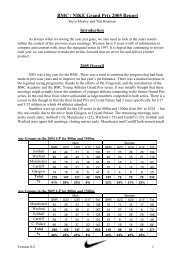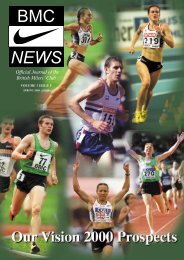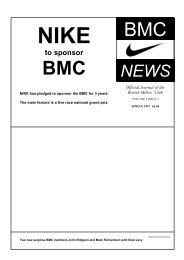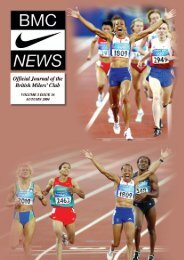Create successful ePaper yourself
Turn your PDF publications into a flip-book with our unique Google optimized e-Paper software.
BMC April <strong>1999</strong> 6/6/99 9:07 pm Page 16I.A.A.F. Code of Ethics for Coachesby Peter ThompsonWork commenced on the ‘IAAF Code of Ethics for Coaches’ in February 1996 as part of a largerproject, the global IAAF Coaches Education & Certification System. This code of ethics was approvedby the IAAF Council in March 1997 and given out to the world in a press conference at the World IndoorChampionships in Paris. Subsequently it was translated by the IAAF into French, Portuguese, Spanish,Arabic and Chinese. The code has now been adopted in its entirety by many National Federationsincluding, in the English speaking countries, Athletics Canada, Athletics Australia and Athletics NewZealand.Although this article is directed primarily at coaches it is printed here because it should be of interestto all athletes, permitting them to realise what they should reasonably expect from a coachingrelationship. This includes the responsibilities of the coach to the athlete and the complimentaryresponsibilities of the athlete to the coach. Relationships built on mutual respect of each individual holdthe promise for best outcomes.As a coach, you have many roles to play andhave numerous practical tasks to perform. Eachof these roles and every task involves you inmaking decisions about your actions before youact, even though many times you may not beactively aware of your decision making. One ofthe most important challenges facing coaches isto make these decisions. Your philosophy of lifeguides everyday decisions, while your personalcoaching philosophy guides all decisions youmake as a coach. In addition, as a coach you havean important responsibility to provide yourathletes with values of sportsmanship and fairplay which will last them throughout their lives.Ethics as part of a Coaching PhilosophyAs you gain experience as a coach and have theopportunity to observe other coaches you begin tonotice that the coaching roles they take on may bethe same as yourself but the way in which theycarry out the roles, the way they conductthemselves, may be quite different. Coaching isabout conduct. It is about how you do yourcoaching. This reflects what you believe to beright or wrong, which is decided by your moralsand ethics, a part of your coaching philosophy."Why should ethics be important in sport? Inevery human activity, there must be considerationof its effect on the participants and on society ingeneral. Sport must involve others, some as fellowcontestants, others vicariously as spectators andeducators. Sport touches every segment of societyand is a powerful social force, for good or evil. Itcannot therefore, exist outside ethical considerations."Dubin Enquiry, Canada 1989Personal ethics simply tells you what is ÔrightÕand what is ÔwrongÕ and this will tend todetermine your conduct or behaviour. Yourethical values do not remain necessarily the sameor constant throughout your life but may developor mature. If we think about the conduct orbehaviour of children, then we can observe that,generally, they are less ethically mature thanadults. When you work with athletes you notonly have to be aware of your own ethical valuesbut also the ethical values of the athletesthemselves.A Code of Ethics for CoachesThere is sufficient evidence for us to accept thatthe relationship between the athlete and coach hasa fundamental influence on the moral developmentof the athlete. The coach must act in away that provides a suitable role model under allcircumstances. For this reason, many coacheshave formulated a personal code of ethics to guidetheir decisions and actions. An increasing numberof Member Federations of the I.A.A.F. havedeveloped, or are in the process of developing, anational code of ethics for their coaches. In identifying,and in response to, this need the I.A.A.F. isasserting an active leadership role in producing theI.A.A.F. Code of Ethics for Coaches, the first suchThere is sufficient evidence for us toaccept that the relationship between theathlete and coach has a fundamentalinfluence on the moral development of theathletecode of any International Governing body of anOlympic Sport. This world wide code to provideguidance for all coaches contributing to athletics isreproduced in its entirety on the adjacent pages.You are encouraged to read the contents carefullyand to apply the code within your own coachingsituations.Ethics and DopingWhy do athletes use prohibited substances andpractices? If you examine the doping issue inAthletics you find that the use of prohibitedsubstances may in most instances be ascribed toone or more of the following reasons:¥ A belief by athletes and coaches that allsuccessful athletes are using illegal methods.¥ The athlete and coach believe that the athletehas reached his/her potential and natural limit ofperformance.¥ The athlete believes that the coach does nothave the knowledge to further assist in improvingtheir performance.¥ The coach has reached the limit of his/herknowledge and believes that doping will be thekey to further improvements in performance.¥ External pressures on the coach and/or athleteto produce performances without appropriateregard to the potential of the athlete, orknowledge of the lengthy time scales to achievethat potential using natural methods.The I.A.A.F. is taking the most active steps ofany International Federation to eradicate illegaldoping practices from the sport. These steps havetraditionally been directed most noticeably at theindividual athlete and have comprised the threecomplementary elements of education, testingand punishment, with education the most poorlyapplied. It is now time to direct more attentionspecifically to the activities of coaches, as they areintimately involved in the preparation of athletesEthical considerations leading to fairplay are integral, and not optional,elements of all sports activityand themselves handle several generations ofathletes during a coaching career. One corruptathlete principally impacts the self, a corruptcoach, however, has the position to corruptlyimpact all the athletes in his/her squad and allsubsequent squads in their coaching career, inaddition to influencing other coaches to whomhe/she is a mentor. To use an African analogy: "Ifyou educate the mother, you educate the family."Now we can substitute: "If you educate the coach(ethically), you educate the athletes." . In essencethe Code reflects much that is contained withinthe Council of EuropeÕs Code of Sports Ethics.I.A.A.F. Code of Ethics for CoachesIntroductionThe basic principle of the I.A.A.F. Code ofEthics for Coaches is that ethical considerationsleading to fair play are integral, and not optional,elements of all sports activity. These ethicalconsiderations apply to all levels of ability andcommitment. They include recreational as wellas competitive Athletics.The Code provides a sound ethical frameworkto combat the pressures in modern day society.Many of these pressures appear to be underminingthe traditional foundation of sport -foundations built on fair play and sportsmanshipand, in many instances, on the voluntary16BMC News : <strong>Spring</strong> <strong>1999</strong>















